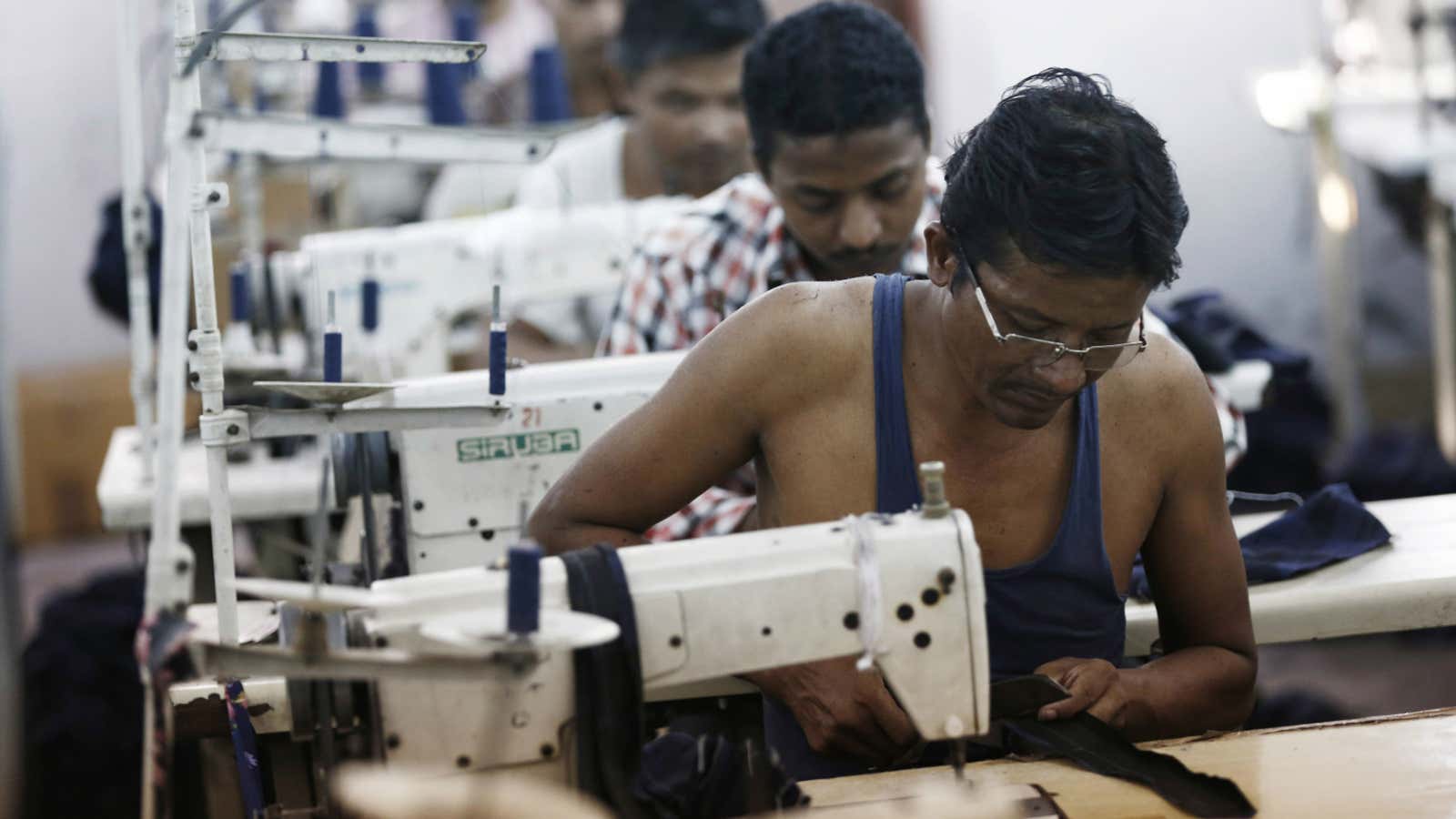Brexit will do no favours to India’s $9.3 billion (pdf) export trade with the UK.
Indian exporters are concerned over a fluctuating currency and global stock market volatility that are likely to impact bilateral trade. India exports a range of goods and services to the UK, including apparel, motor vehicles, pharmaceuticals, IT services, and gems and jewellery.
Late last week, the British pound (GBP) dropped more than 10% against the dollar, sliding to a level not seen since the 1980s. The rupee, meanwhile, fell to a four-month low against the US currency. ”So, volatility of the currency is something which might have an immediate impact on our exporters,” commerce and industry minister Nirmala Sitharaman told reporters on June 24.
Alongside, the UK’s exit from EU could trigger the need for fresh talks between India and EU on a free trade agreement (FTA). India has been negotiating an FTA with EU since 2007.
India will gradually hold talks with its European counterparts over the FTA, suggested Sitharaman. “I would think, they (EU) would need time now to assimilate this (Brexit) outcome. Once they assimilate the outcome, they will only then respond… I will talk to my counterparts,” Sitharaman said.
Here’s a list of businesses that may gain or lose from this geopolitical shift.
Apparel
Stock market volatility and currency fluctuations are expected to hit apparel exports just when they were reviving from a five-month decline since January, traders said.
EU is India’s largest apparel market, with 37% of all exports going there. Among EU countries, the UK has the biggest share, earning India Rs11,800 crore ($1.73 billion) in 2015. That is roughly 10.6% of the total Indian garment exports.
“Britain is our largest market in the European Union, accounting for around 30% of our exports to EU. Its exit would significantly dilute the relevance of the EU FTA for us,” said Ashok G Rajani, chairman, Apparel Export Promotion Council, an industry body that monitors apparel exports from India.
“With Brexit on, the only way to expand business in the UK would be through bilateral negotiations, which would mean a new set of negotiations and a longer timeline,” Rajani said. But that’s easier said than done, as UK’s exit from EU could take up to two years.
Tea
Britain is one of the world’s largest buyers of Indian tea, importing 20.2 million kilos in 2015.
For now, Indian tea exporters say, the currency volatility will have only a short-term impact. “Most of the tea trade to EU is done in dollars. There will be an intermittent effect, ultimately it will settle down. Price realisation, for some exporters, will be down because of fluctuation in currency,” Sujit Patra, secretary at the Indian Tea Association, told Quartz.
While a devalued pound will make imports expensive for the UK, it will also make the market more competitive.
“If, say, African tea also becomes expensive to buy, then we are in business. But if we remain expensive and African currencies devalues against the pound, then they will prefer to buy from Africa,” Azam Monem, executive director at McLeod Russel India, the world’s largest tea-growing company, told Quartz. In the short term, he said, “business will be tougher from previous years as trading barriers will come in because of the fluctuating currencies.”
Gems and jewellery
Gems and jewellery exporters, on the other hand, anticipate the fluctuating currency to moderately impact the less than $4-billion trade between the two countries. India imports rough diamonds from the UK and exports precious gems and jewels.
Demand could be hit as “a depreciating GBP would reduce the purchasing power of Britons, resulting in a proportionate decline in the purchase of gems and jewellery, which will hurt India’s exports,” Vipul Shah, managing director at Asian Star Company, an ornament exporter, told Business Standard.
However, currency fluctuations will have limited impact on the trade, in which dollar is the preferred one.
“There will be no impact even if the pound and euro would weaken due to Brexit. But, in the long run, rupee’s devaluation against the dollar would definitely hit both, import of rough diamond and export of finished ornaments,” said Praveen Shanker Pandya, chairman, Gems and Jewellery Export Promotion Council (GJEPC).
